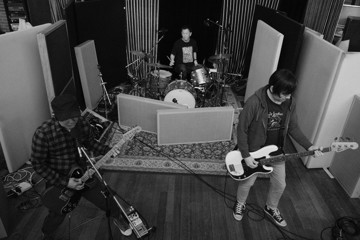Good Or Shit: Joni Mitchell: Songs Are Like Tattoos
"Joni articulated the intoxicating nature of love and the melancholy, the madness, of loss."
“Songs are like tattoos.”
I was pottering around my room the other day, listening to the radio, putting things away, getting ready to go out for lunch. It was a sunny, hangover-free Sunday and I was happy. I wasn't thinking about much other than what to wear to lunch when Joni Mitchell's California came on the radio. I turned around and looked at the computer through which I was streaming the radio. The computer looked back at me, as if it was making eye contact with me, smiling in a knowing way. “Yes, you remember this, don't you?” it was practically saying.
On the 7th November, Mitchell turned 70. Tributes and retrospectives appeared across media platforms. Artists like Rufus Wainwright and James Blake discussed her influence on their music, people counted how many times A Case of You has been covered, and many articles discussed the unforgettable 1971 album Blue.
Blue is not just considered Joni Mitchell's best album, but one of the best albums ever. Praised as a complex, intense emotional scourge. Full of bliss and bombshells. A rare example of magnificent raw honesty. As Mitchell told Rolling Stone in 1979: “there's hardly a dishonest note in the vocals. At that period of my life, I had no personal defences. I felt like a cellophane wrapper on a pack of cigarettes. I felt like I had absolutely no secrets from the world and I couldn't pretend in my life to be strong. Or to be happy. But the advantage of it in the music was that there were no defences there either.”
Don't miss a beat with our FREE daily newsletter
When the short Joni Mitchell tribute stopped playing , in a sort of daze, I brought up YouTube and went through River, A Case of You, and Blue. And yes I remembered. Songs are like tattoos. And I haven't forgotten how I used to cut myself to Blue.
Ergh, it sounds so grim. So sad. And not like sympathetic-sad, not like romantic-sad. More lame-sad. So – oh God – emo. It went on for years in the late 90s and early 2000s. It was like an addiction.
Every time I was overwhelmed and gasping for air I would grasp for something sharp. I had tools, nothing sophisticated. Broken glass, which I kept in my wallet. Every time I accidentally broke something, I would run my finger along the edges of a shard determining how sharp it was, to see if it could be used for later. Sharp was best, I didn't want to hack and gouge my skin. I wanted it to slice smoothly, to feel the burn and watch the blood appear. Then look over my body with the same facial expression that weird teenager in Homeland is always pulling and think – oh, that's what the pain I can't seem to articulate looks like.
Eventually, in one of my darkest moments, I slipped off to the bathroom at a party. But when the, um, exercise, failed to stop the flow of emotion, I blurted it all out to a friend, sobbed uncontrollably. She took the shards away from me. It's been 10 years since she's had to check my wallet.
Why? A deep sense of worthlessness and self loathing that, at the time, was inexplicable to me. I would never have been able to articulate why I felt the way I did because I never understood it myself. It wasn't until years later that I was able to see how I had translated certain events in my childhood and my teens into proof that I was worthless. And, to see that it wasn't true.
Love and loss. I was suffering from love and loss. And Blue is the soundtrack. Joni articulated the intoxicating nature of love and the melancholy, the madness, of loss.
Argh. Being a teenager is like having conjunctivitis in one eye. You're opening up to life, starting to see things clearly through your left eye, while being blinded with pus in the other. In one of the many articles I read about Mitchell in the last few days I found this in the comments – “[Blue] was the album I listened to on a loop as a sad, depressed 16-year-old with no friends. It was my only friend for a while there. I find it difficult to listen to, as an adult, but I still include River on my holiday playlist.”
I've been listening to Blue for the past week. I don't find it difficult. I find it immensely beautiful. I've been pottering around my room, putting things away, singing all the words, sometimes I can even do the high notes, and with a smile on my face, especially when singing some of the saddest lyrics. It's like what Emma Thompson's character says to her husband in Love Actually, when he says he can't believe she still listens to Joni Mitchell.
“I love her,” she tells him. “And true love lasts a lifetime. Joni Mitchell is the woman who taught your cold English wife how to feel.”
And I empathise with the lyrics more now than I ever did back then. Because I understand all that shit about life being like a tide that ebbs and flows. And sometimes it breaks banks and floods everything you know. Panic and you'll drown. Go with it and you'll become a strong swimmer.
Most of my scars from back then have healed; a small few remain. My Blue tattoos.







